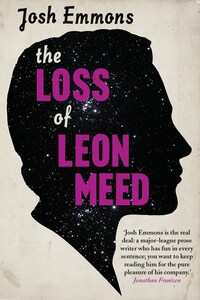THE LOSS OF LEON MEED
Josh Emmons
The Friday Project
An imprint of HarperCollinsPublishers
1 London Bridge Street
London SE1 9GF
www.harpercollins.co.uk
This edition published by The Friday Project 2015
First published in the USA by Scribner in 2005
Copyright © Josh Emmons 2005
Cover Layout Design © HarperCollinsPublishers Ltd 2015
Josh Emmons asserts the moral right to be identified as the author of this work.
A catalogue copy of this book is available from the British Library.
This novel is entirely a work of fiction. The names, characters and incidents portrayed in it are the work of the author’s imagination. Any resemblance to actual persons, living or dead, events or localities is entirely coincidental.
All rights reserved under International and Pan-American Copyright Conventions. By payment of the required fees, you have been granted the non-exclusive, non-transferable right to access and read the text of this e-book on screen. No part of this text may be reproduced, transmitted, down-loaded, decompiled, reverse engineered, or stored in or introduced into any information storage and retrieval system, in any form or by any means, whether electronic or mechanical, now known or hereinafter invented, without the express written permission of HarperCollins.
Source ISBN: 9780007592906
Ebook Edition © March 2015 ISBN: 9780007592913
Version: 2015-03-05
‘Here’s how you know Josh Emmons is the real deal: he’s created a full spectrum of Californian characters who are ludicrous and ill-behaved and lovable in equal measure; he’s a major-league prose writer who has fun in every sentence without ever showing off or hitting a phony note; and you want to keep reading him for the pure pleasure of his company’
JONATHAN FRANZEN
‘Emmons writes with crisp, gratifying authority. The Loss of Leon Meed has considerable appeal … and succeeds in finding comic potential in unlikely places’
New York Times
‘Emmons cycles through and illuminates the plights of his diverse, crowded cast – including a recovering alcoholic, an overweight therapist and a Korean hippie – with a finesse that approaches that of a seasoned literary ventriloquist. The characters’ stories take on a cumulative, mesmerizing rhythm’
New York Times Book Review
‘An audaciously ambitious first novel … The Loss of Leon Meed is a canny status report on the American soul … engaging, enigmatic’
Los Angeles Times
‘A mystical ensemble fable about chance and fate and the importance of not giving up … Emmons has sizable talent [and] a real shape-shifter’s gift for imagining his way into lives different from, and especially older than, his own … There’s wonderful stuff here, little stylistic pleats, serifs and tailfins that root in the mind and just won’t budge. Its central enigma rewards speculation’
San Francisco Chronicle
‘As remarkable and moving a portrait of America as I have seen in some time’
GARY SHTEYNGART, author of Super Sad True Love Story
Contents
Cover
Title Page
Copyright
Praise
Dedication
Part I
Chapter 1
Chapter 2
Chapter 3
Chapter 4
Chapter 5
Chapter 6
Part II
January 15
Part III
Chapter 1
Chapter 2
Chapter 3
Chapter 4
Chapter 5
Chapter 6
Epilogue
Acknowledgments
About the Author
Also by Josh Emmons
About the Publisher
Once, if you had driven north on Highway 101 from San Francisco past its outlying bedroom communities and vineyards and hippie enclaves, beyond blighted motels and one-pump gas station towns, over a road at times so winding and mountain-clinging that a moment’s distraction could steer you off a cliff and into freefall, you would have reached Eureka, the coastal seat of Humboldt County in northern California. It was a city whose forty thousand inhabitants faced the Pacific Ocean on one side and all of America on the other. It sat between the deeps.
You might then have forgotten about it if you were continuing on to the cities of consequence, to Portland or Seattle. Or to the windswept streets and unspoiled air of Canada. Or to the North Pole. You might have been scaling the planet and in no mood for its way stations.
But if you had stayed in Eureka, you would have discovered a weathered city with an almost granular fog and a high cloud cover, with temperatures rarely dipping below forty-five or climbing above seventy-five degrees Fahrenheit, where tourists wondered how they’d slipped out of the California Dream. You would have wondered this, too, if you had compared the steely sky and faded architecture of Eureka with the sun and oceanfront villas of that dream. You would have thought that something was wrong.
The thing about dreams, though, is that they’re products of the imagination, and the imagination, like all engines of terror and transcendence, can do anything.
On an afternoon in late November, the last of the school buses pulled away and fourth-grade teacher Elaine Perry realized that she hadn’t asked any of her students to clean the chalkboard erasers. She stood by the tetherball pole and kicked a wood chip that sliced cleanly through the air and came to rest on the edge of the playing field where earlier that day a third grader had broken his leg. Children led dangerous, thrill-seeking lives. Spidering over jungle gyms, roof climbing, bike racing, contact sports. They chose the reckless and perilous, gravitated toward jeopardy and disaster. Adulthood is all about repressing that instinct, Elaine thought as she stared at Muir Elementary School’s main building, and learning to desire the predictable and unthreatening. Principal Giaccone’s office window was open. She hated cleaning the erasers and had been pleasantly surprised to learn when she began teaching in September that her students loved it. Giaccone had stopped by her classroom on the first day of school with a waxy red apple. “The forbidden fruit,” he’d said, presenting it to her. “Only if it’s from a certain tree in Eden,” she’d said, holding it up and reading its small white sticker: “This one comes from Washington.” Giaccone smiled and said he hoped her students appreciated what a clever teacher they were getting, that his own fourth-grade teacher, Miss Costigan, in addition to being the only centenarian in his hometown, had been a yearlong lesson in crotchetiness. Elaine caught the emphasis he gave to














